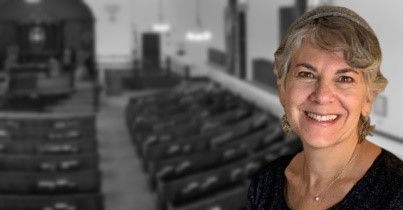Written by: Rabba Kaya Stern-Kaufman

I want to begin by thanking Pastor David Clark whose ideas greatly influenced my sermon today.
We are so blessed to live in such a beautiful place, where each season brings its treasures and where in particular, the fleeting days of the seacoast summer expresses a kind of perfection that launches us all into a state of gratitude. How can we not be grateful? Opening my shades most mornings to the blue sky, the clean air, the sounds of birdsong lifts my spirits. And what makes the summer all the more precious, is that we all know in our bones, that this will not last. For ahead of us lie six months of descending energy; of cold and chill before we can return to this perfection. And so, at this tekufat hashanah– this turning of the year, we gather together our entire community at this perfected moment of balance- as the Autumn Equinox lies right before us. We take nourishment, courage and strength from our community. We engage in ancient rituals to prepare us in body and soul for the changes to come. We are travelers through the seasons of life, always turning and re-turning. In the midst of change we find comfort in the steadiness of our ritual lives, in family memories, in our community, in our relationships.
Dear Friends, I begin today by letting you know that I am going to be speaking about Israel this morning. I recognize that within our diverse community we hold different points of view, but I want to remind us all that our strong feelings emerge from the same source of connection and concern we share for the land and her people, our people. So let’s take a deep breath together and consider not only recent events, but the teachings of our Rabbinic Sages over the past 2000 years.
Taking a look at the wider region of the Middle East, we are all too familiar with the religious violence which has resulted from both theocracy and fundamentalist interpretation of Islamic holy texts: bloody conflicts between Shia and Sunni, oppression of women, and persecution of religious minorities. But are these antidemocratic and archaic religious tendencies confined only to the Muslim world?